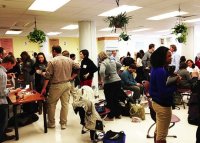EduCon: Not Your Typical “Sit and Git” Conference
Your content has been saved!
Go to My Saved Content.I pulled up a chair next to a woman at the EduCon conference at the Science Leadership Academy (SLA) in Philadelphia this last Saturday. After some brief introductions I learned her heavy Southern accent hailed from Arkansas, that she was shocked by how cold it was, and that it was her first time attending the conference. I asked her how she liked EduCon so far. "I love it," she said. "It's not your typical 'sit and git' type conference."
That's a great summary, indeed.
Discussion and Debate
Many conferences sport that "sit and git" model, where attendees listen to a presenter speak. At most of the more traditional formats, I seem to find a tidbit here, a new way to phrase something there, or hear a tale of someone doing something innovative. In other words: one-way communication.
The EduCon website has this description:
More than any other conference I've attended, Educon does two things. It drives me to question my knowledge and practices, and to collaborate with some great thinkers to continue building ideas.
Conference sessions at Educon are led by "facilitators" rather than "presenters." These folks frame up ideas to session attendees and then pose questions for them to explore in smaller groups via discussion and/or activities. Small groups then share discoveries with the full session, and resources are shared online. Most sessions run a few cycles of this flow. You have the chance to hear many perspectives and opinions on a subject in this framework. The shared insights and experience in the room push the conversations further. Good classroom pedagogy, don't you think?
Of course, this conference takes place at SLA, which is a school with all its imperfections, wear and tear, grit, and classrooms. The work students and adults create at SLA, their core values, and thought-provoking themes by grade level are all on display. SLA feels more like an incubator or messy startup lab than a school. It's easy to see that SLA's roots have grown into the conference.
Ideas in Motion
EduCon 2.5, this year's rendition, pushed my thinking more than previous iterations. In the hallway, I had a discussion with Chris Lehmann, SLA's principal, about how it has evolved. "In years past," Lehmann said, "we shared a lot of great ideas and innovations. This year it's more about . . . " and he began searching for a word. "Process," I said, "and Design Thinking." "Exactly! How to set these great ideas into motion," Lehmann said.
Indeed, more sessions at this year's conference spoke about how to encourage student learning via empathy, Design Theory, promoting inquiry, engaging in messy assessment, and exploring craft. Here are three examples of what I'm talking about:
EduCon is also far from a "tech conference." It's not tool centric. Much like the work with students brewing at SLA, "tech" is deeply integrated into the things people do. The social media river that flows through the conference, perhaps even over it, is a great example.
Prior to, during and long after the conference itself, people post (tweet) insights on Twitter using the #educon hashtag. Searching the #educon thread on Twitter and following some of the sources its participants cite can be a bit like trying to find small round stones in a rushing river. Try a search for #educon, and you'll see what I mean. In all variety, you'll see insights into what folks learned, quotes that resonated, references to resources, what they ate, who they hung out with, and conference reflections. Parsing through the posts using the #educon hashtag shows people building relationships and forging knowledge together. That's usually when the best ideas take flight.
So, if you haven't been to EduCon before, dive in and search the #educon hashtag on Twitter and start exploring, then look over the conference conversations (sessions) online. Then get yourself there next year. I have no doubt that, if you do, it'll push your thinking and your craft forward. Hopefully you'll share it with the folks you work with, and it'll do the same for them.
My thanks once again to the students, faculty, parents and Chris Lehmann at SLA for providing a framework for us all to learn. I'm already looking forward to next year.
What's Next
EduCon was my first stop in a semester-long sabbatical. I'm off to travel the world and look at programs that promote student engagement in education. I want to explore what makes these programs successful, how they sustain it, and perhaps even more importantly chat with folks about where they are headed next. A return trip to SLA is already on the itinerary. I'll share what I discover in these travels with you here in future posts.
In the meantime, I’d love to hear about your favorite programs for student engagement. Please share them in the comments area below.
